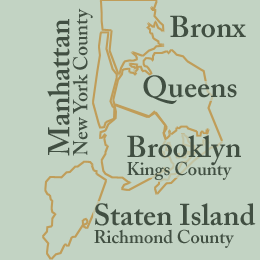Ley de Desalojos Ilegales
Código Municipal Administrativo § 26-521. Desalojo ilegal.
a. Será ilegal el que cualquier persona desaloje o intente desalojar un ocupante de una unidad residencial, ocupante éste que haya residido en dicha unidad por un período de treinta días consecutivos o más o que haya firmado un contrato de arrendamiento relacionado con dicha unidad, de acuerdo a las disposiciones de estabilización de hoteles dentro de la ley de estabilización del alquiler, excepto dentro de lo que permita la ley, de acuerdo a una orden de desalojo u otra orden de un tribunal de jurisdicción competente o de una orden gubernamental de desalojo que permita:
(1) el uso o la amenaza de uso de fuerza para persuadir al ocupante a que abandone la unidad donde reside; o
(2) enfrascarse en una conducta que interfiere con o tiene como objetivo interferir con o perturbar la comodidad, el descanso, la paz o la quietud del ocupante que utiliza u ocupa la unidad residencial, para persuadir al ocupante a que desaloje la dicha unidad incluyendo, pero sin limitarse a, la interrupción o el paro de los servicios esenciales; o
(3) enfrascarse o amenazar con involucrarse en cualquier otra conducta que evite o tenga como propósito evitar que dicho ocupante permanezca legalmente en dicha unidad residencial o para persuadir al ocupante a desalojar la unidad incluyendo, pero sin limitarse a, el traslado de las posesiones del ocupante fuera de la unidad residencial, la eliminación de la puerta de entrada hacia la unidad residencial, la eliminación, el entaponamiento o cualquier otro modo de desactivación de la cerradura de dicha puerta; o cambiar la cerradura de dicha entrada, sin suministrarle una llave al ocupante.
b. Constituirá un acto ilegal para un propietario de una
unidad residencial el no tomar acción razonable y necesaria
para reinstaurar la ocupación de un ocupante de una unidad
residencial que ya sea deje vacante, haya sido desalojado de o de
cualquier otra manera se le impida ocupar dicha unidad residencial,
como resultado de cualesquiera de los actos u omisiones prescritas
en la subdivisión "a" de esta sección e
impedir a dicho ocupante el uso de una unidad residencial dentro
de tal edificio, apta para ocupación habitacional, después
de haber sido solicitada por dicho ocupante o el representante de
él o ella, si dicho propietario tenía conocimiento
de tales actos ilegales u omisiones o si tales actos y omisiones
ocurrieron dentro de un período de siete días previos a dicha solicitud.
Real Property Actions and Proceedings Law Section 768.
1. (a) It shall be unlawful for any person to evict or attempt to evict an occupant of a dwelling unit who has lawfully occupied the dwelling unit for thirty consecutive days or longer or who has entered into a lease with respect to such dwelling except to the extent permitted by law pursuant to a warrant of eviction or other order of a court of competent jurisdiction or a governmental vacate order by:
(i) using or threatening the use of force to induce the occupant to vacate the dwelling unit; or
(ii) engaging in a course of conduct which interferes with or is intended to interfere with or disturb the comfort, repose, peace or quiet of such occupant in the use or occupancy of the dwelling unit, to induce the occupant to vacate the dwelling unit including, but not limited to, the interruption or discontinuance of essential services; or
(iii) engaging or threatening to engage in any other conduct which prevents or is intended to prevent such occupant from the lawful occupancy of such dwelling unit or to induce the occupant to vacate the dwelling unit including, but not limited to, removing the occupant's possessions from the dwelling unit, removing the door at the entrance to the dwelling unit; removing, plugging or otherwise rendering the lock on such entrance door inoperable, or changing the lock on such entrance door without supplying the occupant with a key.
(b) It shall be unlawful for an owner of a dwelling unit to fail to take all reasonable and necessary action to restore to occupancy an occupant of a dwelling unit who either vacates, has been removed from or is otherwise prevented from occupying a dwelling unit as the result of any of the acts or omissions prescribed in paragraph (a) of this subdivision and to provide to such occupant a dwelling unit within such dwelling suitable for occupancy, after being requested to do so by such occupant or the representative of such occupant, if such owner either committed such unlawful acts or omissions or knew or had reason to know of such unlawful acts or omissions, or if such acts or omissions occurred within seven days prior to such request.
2. Criminal and civil penalties.(a) Any person who intentionally violates or assists in the violation of any of the provisions of this section shall be guilty of a class A misdemeanor. Each such violation shall be a separate and distinct offense.
(b) Such person shall also be subject to a civil penalty of not less than one thousand nor more than ten thousand dollars for each violation. Each such violation shall be a separate and distinct offense. In the case of a failure to take all reasonable and necessary action to restore an occupant pursuant to paragraph (b) of subdivision one of this section, such person shall be subject to an additional civil penalty of not more than one hundred dollars per day from the date on which restoration to occupancy is requested until the date on which restoration occurs, provided, however, that such period shall not exceed six months.


